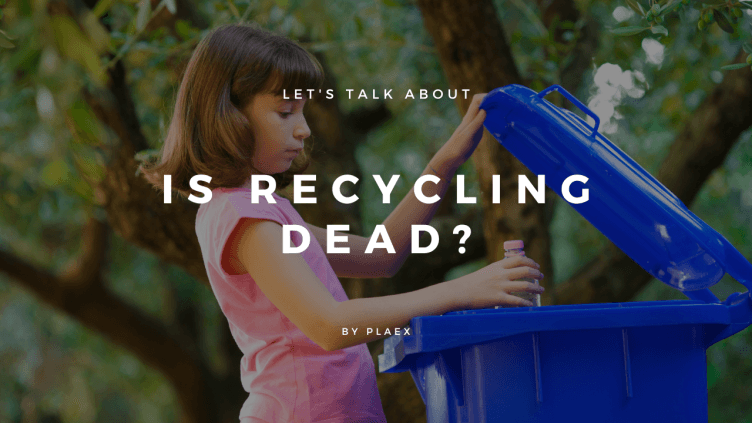Is Recycling Dead?
19 January 2023, By PLAEX Technologies

Do we truly no longer recycle as we once did?
The method we used to gather and get rid of recyclable waste has changed for a number of reasons, some of which are global in character.
Recycling will continue to advance in the future. Since curbside pickups, recycling has advanced significantly. In fact, technology has advanced to the point that nearly anything can be recycled, and new innovations are in the pipeline.
Some countries believe that recycling is dead and stopped pursuing it. This has also made people and businesses stop recycling. However, recycling may not be dead as some may think.
It is crucially important to recycle in order to protect our environment for the present and future generations.
Countries That Stopped Recycling

Plastic waste pollution is a global issue, and all nations must implement more effective long-term policies in the fight against plastic waste.
Nevertheless, some nations lag behind others significantly. Due to their large populations, nations like China and the United States are the worst offenders in terms of raw volume of plastic pollution, but the best indicator of success or failure is to look at the proportion of plastic waste that ends up in landfills.
With fewer than 1% of their overall usage actually being recycled, Chile ranks as the worst country in the world for recycling plastic. Sadly, a whopping 99.1% of it ends up in landfills.
The Chilean public's determination to improve itself is shown by a ground-breaking recycling effort in one of Santiago's poorest areas, despite the fact that money has undoubtedly been a huge problem.
Turkey recycles only 1% of its total plastic, same to Chile, with the remaining 99% ending up in waste landfills.
The only two nations to experience a fall during this period are Chile and Turkey, however the government's Zero Waste Project is expected to considerably increase recycling rates during the following years. In fact, by 2023, the nation hopes to achieve 35%.
Mexico continues to be in a terrible situation with only 5% of its plastic being actually recycled. However, the nation has undertaken a number of efforts at the official level, and people are also making an effort.
One of the main causes of the nation's issues is the fact that appropriate waste management in the slums is still not available.
It makes sense that Greece's recycling practices haven't improved to the intended degree given the country's recent economic difficulties.
Even so, recycling has grown by 176% from the year 2000, and Greece is now a late adopter. The important reality is that progress has been made and is expected to continue over time, even though EU sanctions have played a role in it.
Israel sends 81% of its plastic waste to landfills and only 19% to recycling facilities, similar to Greece. Israel too had recent political issues to concentrate on, just like Greece.
Why Companies Don't Recycle But Should

The majority of firms will still review the three main waste management options and select the one that best suits their unique trash requirements.
However, there are still a lot of factors at play that prevent many firms from recycling their waste.
Recycling is inconvenient. People still believe that recycling requires time and effort, which is one of the main excuses given by businesses for not recycling.
Businesses have no incentive to recycle. There are undoubtedly advantages to recycling, with possible cost savings being the biggest, but when it comes to company recycling, there seem to be more negative than positive incentives. For instance, the local government does not offer enough residential recycling services, and more work needs to be done to offer businesses definite, concrete incentives to recycle.
Businesses have to pay to recycle. The majority of enterprises produce a lot more rubbish than residential houses do, thus they must pay for its collection. A trash policy is necessary to determine the cost/benefit of hiring a waste carrier to collect it. Instead, the simple solution is to simply dump the trash in the skip.
Businesses have to source a suitable waste carrier. Many companies think it's challenging to discover a trustworthy waste collection or are unsure of the services they can provide.
Corporate Social Responsibility

By engaging in corporate social responsibility, firms are altering their mindsets and overcoming the logistical and cultural barriers that prevent them from recycling their waste (CSR).
This entails, in particular, being seen to be doing their share to reduce waste output and environmental damage.
As a first step in this process, developing a firm recycling and waste policy demonstrates to consumers that they are dedicated to conducting business in an ethical and forward-thinking manner.
Effectively, CSR is about using common sense in trash management and recycling just as much as it is about a business's commitment to being a responsible organization.
Final Thoughts
Why then do we keep hearing about recycling's demise?
Simply said, a number of issues have increased recycling costs, increased material loss at MRFs, and increased contamination of recyclables, resulting in lower yields.
At PLAEX we can help your business drastically with brilliant Artificial Intelligence Technology that incorporates and makes use of AI with automatic waste sorting bins.
How would you like to be part of the change to a more sustainable future?